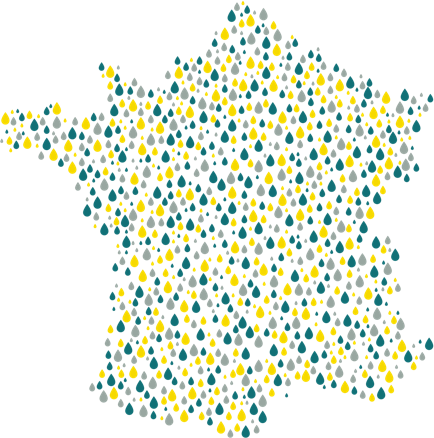Non-collective sanitation
All the answers to your questions about sanitation and phyto-purification.
What is SPANC?
SPANC: the Public Service for Non-Collective Wastewater Treatment is the preferred representative to inform and advise you in the field. They can also monitor your installation. Visit your town hall to find out more.
Who is in charge of the refurbishment work during a sale: the buyer or the seller?
The refurbishment work of the NCS installation is the responsibility of the seller. However, they may decide not to carry out the work and inform the buyer of such. The buyer can knowingly decide to purchase the property or not. Generally, there is a reduction in the price of the property for any work. The buyer then has one year to make the compliance upgrade.
What are the sanitation obligations?
When a dwelling cannot be connected to the sewage system, it is said to depend on non-collective sanitation. Individuals who own one of these dwellings have several obligations which were introduced by the LEMA law of 2006 according to several possible cases:
- Presence of an NCS installation: it is essential to check that the system is functioning correctly. SPANC is competent in this field and gives an opinion on the compliance of the installation. An unfavourable opinion from the agent creates the obligation to refurbish within four years. The period is reduced to one year in the event of selling the dwelling.
- Absence of an NCS installation: obligation to connect the dwelling to a sanitation system by following the guidelines established by SPANC. The choice of system depends on the technical constraints, the type of soil, local regulations and the owner’s wishes.
In the event of sale of the dwelling, the owner must, since 1 January 2011, annex the diagnosis of correct operation and maintenance of the installation, carried out by SPANC, to the promise of sale or, failing that, to the notarised deed of sale.
Choosing Aquatiris Sanitation Gardens gives you a strong argument. This innovative system does not require any emptying, has a lifespan of more than 40 years and blends perfectly into your environment.
What is an approved channel?
There are two protocols to obtain approval:
- The long protocol in demanding conditions (48 weeks)
- The simplified protocol for CE marked systems (38 weeks in non-demanding conditions)
The Sanitation Garden is the only system to have passed the long protocol since the publication of the decree of 7 September 2009.
The results show that the Sanitation Garden (Roseaux Line and Iris Line) are both reliable and robust, obtaining a faultless result, even under difficult conditions of underload, shutdown and restart, 200% overload for four weeks, inoccupation stress (alternating days of shutdown and restart).
Aquatiris obtained several ministerial approvals and extrapolations (extension of approval to other sizes and materials) in 2011, 2014, 2016 and 2018.
Today, Aquatiris offers a wide range of Sanitation Gardens to adapt to all types of projects.
By choosing an Aquatiris, Sanitation Garden you are therefore opting for a system included on the list of regulatory channels which your SPANC (Public Service for Non-Collective Wastewater Treatment) can validate.
Consult the Official Journal:
Approval for the FV + FH sector (two filters) n°2011-022 mod03 and 2011-022 mod03 ext01 to 2011-022 mod03 ext19
Approval for the FV sector (one filter) n°2014-014 mod02 and 2014-014 mod02 ext01 to 2014-014 mod02 ext19
What is a population equivalent (PE) and how should I size my installation?
The sizing of an NCS system is not based on the actual number of occupants of the dwelling, but on its maximum occupancy potential.
The calculation rule adopted is therefore 1 population equivalent = 1 main room or even 1 PE = 1 PP4.
It is on this basis of calculation that the Aquatiris expert or the general design office will assess the necessary sizing for your home. The “main rooms” are defined as being those intended for living or sleeping, as opposed to “service rooms”, such as the kitchen, bathroom and utility room.
What is non-collective sanitation (NCS)?
Non-collective sanitation brings together all the rules and systems allowing the treatment of wastewater from housing that cannot be connected to the collective sewage network. The systems treating wastewater from dwellings with a population equivalent (PE) of up to 20 are considered to be the heart of non-collective sanitation.
Beyond 20 PE, we more generally talk about semi-collective sanitation.




